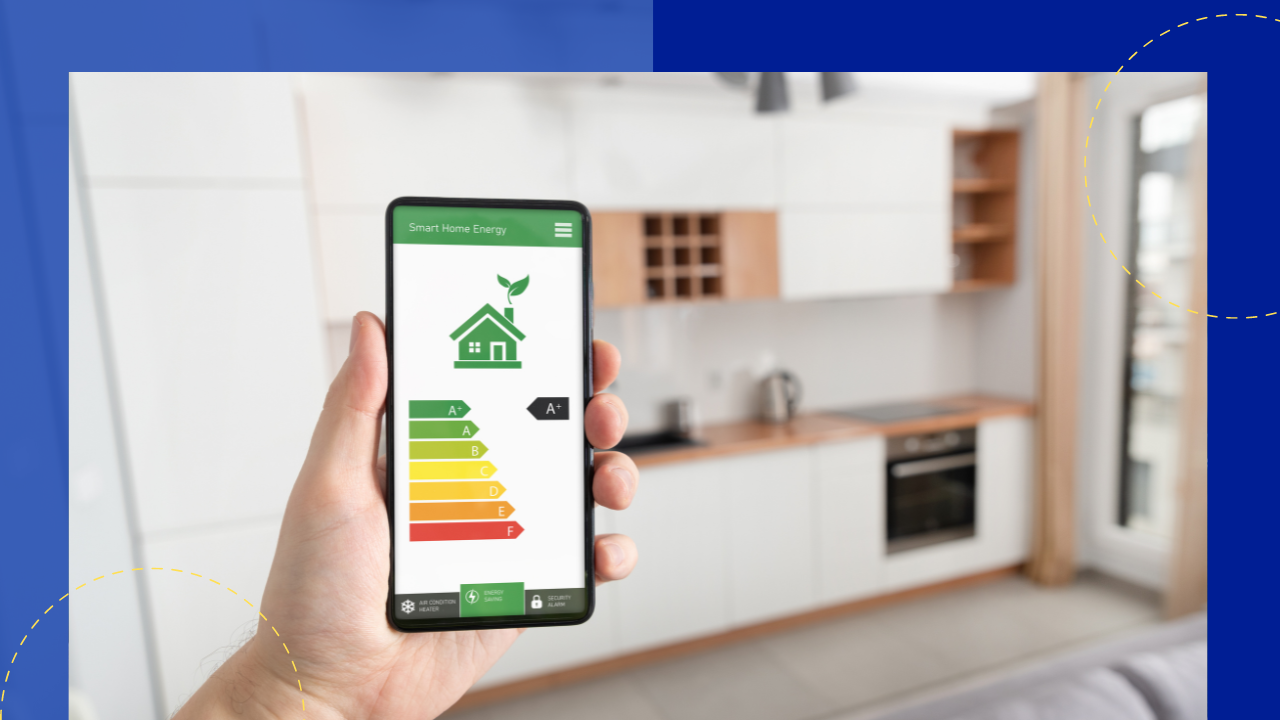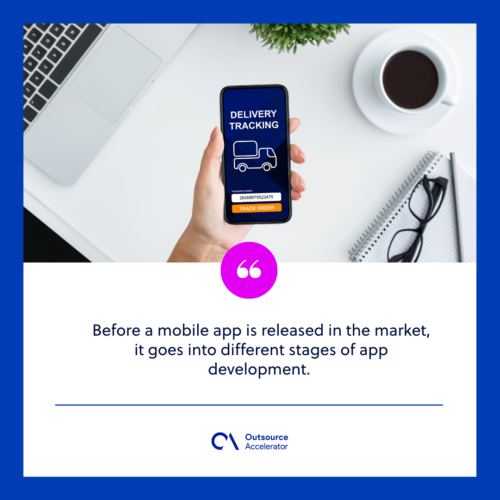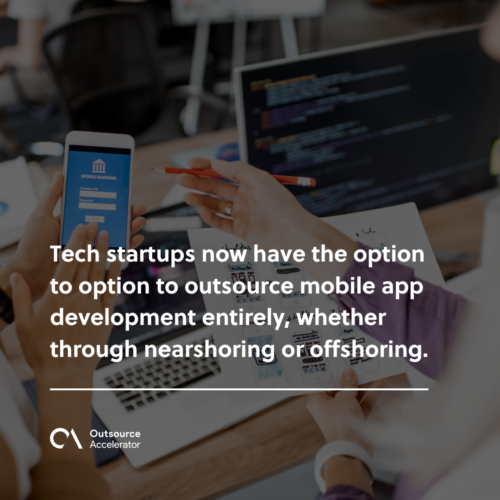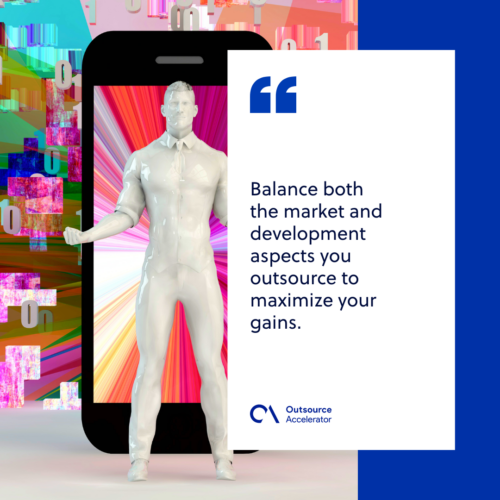3 Strategies for mobile app development outsourcing

Mobile development outsourcing has played a vital role in marketing and growing businesses.
Some companies who find large-scale system development expensive resort to creating mobile ones instead. This has been favorable for them since nowadays, most customers rely on their handheld devices for different purposes.
Those that adopted mobile applications acquired endless favorable circumstances.
Startups and SMEs who cannot rely on hiring in-house teams usually turn to business process outsourcing for app development. Outsourcing leverages their operations by hiring high-quality talents at a competitive price compared to local ones.
Many have been successfully doing this for years, and your business can do it, too, with proper planning and handling.
What is mobile app development?
Mobile app development is the process of creating and developing applications suitable for mobile devices. This process usually involves researching, installing codes, backend services, and beta testing.
Mobile platforms require different sets of software development kits (SDKs). For instance, Apple’s iOS develops mobile apps that work exclusively with their devices. Google’s Android, meanwhile, makes its apps available to different companies that use the same platform.
Mobile apps have become popular over time due to the increasing demand for smartphones around the world.
According to Statista, mobile app revenues in 2021 are now at US$693 billion. Projections, meanwhile, expect this to rise to around US$950 billion by 2023.
Nowadays, you can find different apps for everyday needs, such as computing, task management, communication, and social media.
Stages of mobile app development
Before a mobile app is released in the market, it goes into different stages of app development.
Research
App development starts with research. Assigned researchers study their target market’s behavior, consumer trend, product demand, and the features to include in the application.
Wireframing technical aspects
A team then creates a foundation or skeleton on how the app will work, its interface, and its functionality. This also involves the platforms the app will be available.
Designing
Designing involves creating both the prototype and the actual app to release. Once the prototype is created, UX developers are the ones to design the interface and features of the entire app.
Development and testing
This now involves creating the app based on the design and the aspects outlined. This is followed by continuous testing and updates for glitches, bugs, and other issues that will come.
Deployment
After several tests and quality checks, the app is now ready for release to the market. Depending on quality checks, developers continue to update the app for bug fixes, added features, and adaptation to new platform versions.

Why should you consider mobile development outsourcing?
Small businesses like you can also utilize developing mobile apps for internal use or external distribution. Yet, some factors should be considered.
Developing your apps in-house may be effective at first through systems that don’t require complex tasks such as coding. However, it should also require constant maintenance to adapt to platform changes over time.
The actual mobile app development may be costly. This requires hiring app developers, researchers, quality checkers, testers, and project managers. You should also consider the infrastructures and systems needed in creating the app.
In some cases, development plans get held up due to budget constraints and a lack of various essential skills. In such instances, application development outsourcing can be a bright idea.
Tech startups now have the option to option to outsource mobile app development entirely, whether through nearshoring or offshoring. This helps them create quality products at a competitive cost and keep up with the tight competition in the market.
App development outsourcing downsides
However, outsourcing app development still has downsides for a company.
- The final output may be different from what is expected. In the end, the company will shoulder the issues arising from using the app.
- The branding of both the app and the company. Companies might face intellectual property issues on the app developed by their outsourced team.
- Last is the timing. The company and its outsourced team need to synchronize on timing to keep up with their targeted deadlines.
A solution for these cons is creating your outsourcing strategies. This helps you navigate around the cons and turn them into advantages for your company and marketability.

3 Strategies to consider in mobile development outsourcing
To maximize the full benefits of application development outsourcing, and in this case, of mobile app development services, here are 3 strategies you should be applying:
1. Do a cost-benefit analysis when outsourcing
Consider your budget while choosing a service provider for application outsourcing. Do a cost-benefit analysis on several aspects of your app and the operation of your outsourced team to see if this fits you.
Check the app’s technical requirements.
One gauge for cost efficiency is scalability. Your application should be capable of handling an increasing number of users. while maintaining the same algorithm and features.
Another you should consider is the interface and UX design. Additional functionalities add to the timeline extension and workforce needed for your operation.
Check which features should be added during development or can simply be put as updates for the software.
Make a realistic ROI timeframe.
In setting a Return on Investment (ROI) timeframe, know that mobile app development takes time and effort to complete – from app designing to the testing phase before its official release.
At the same time, consider the time it takes for the customers to know about the app, recognize it, and learn how it works until you fully realize its value to your business.
2. Invest in a development option suitable for your business
Your development option relies on your preference and the needs of your business. However, it would help to balance both the market and development aspects you outsource to maximize your gains.
Why go for a development-focused side
You can outsource an entire mobile development process when you have a clear focus on what your software will turn out. With this, you should already know your customers, their preferences and behavior, and the purpose of the app to them.
Why go for a market-focused approach
However, simply outsourcing your development without knowing your market can truly affect the reputation of your product.
Having no market for your product can cause product failure, which leads to the failure of your business. With knowledge outsourcing, you can choose to outsource your market research and analysis first before taking your next steps.

3. Opt for a simple yet functional mobile app interface
Nowadays, your app’s simplicity may likely affect your overall customer experience.
If your mobile app’s interface is easier to use, your customers will learn how to operate it quickly and efficiently. They are highly likely to appreciate it and use it over again which will lead to the success of your objectives.
Otherwise, if the app’s interface seems a bit complicated, customers will likely stop using it after a few times of trying. This may lead to getting negative reviews and eventually, loss of capital.
Maximize your budget for in-house app maintenance
If you choose to acquire a simple app, you need not pay the developers extra to maintain it and keep it up-to-date because you can do such things within your organization.
Instead, outsource app coding to gain more flexibility and keep its maintenance in-house so you can control thos better.
An intuitive design significantly improves customer experience
The intuitive design allows the users to know what to do right when they see the application. They will be confident to use it without the need for specialized training or assistance.
Such a simple feature avoids confusions and triggers excitement from the customers which will, later on, lead to the software’s success and aid in the business’ growth.
Key characteristics of a reputable application development outsourcing provider
When you decide to outsource mobile app development, you don’t just partner with a random firm you come across online.
Firms like Arcanys are known for providing top software developers. They can outsource you professionals who can work on a mobile platform.
Look for an app development outsourcing company that best fits your business’ standards and requirements. Here are some of the qualities to look for when finding the right team:
- The software development team must offer customized development services. This will help you maximize your investment by getting only the features that will add value to your business.
- Their firm should be able to provide an excellent user experience. You can further search about them or use their portfolio as a reference to see if they have the quality you’re looking for.
- They should have a positive work history. You can investigate their team’s portfolio and try to find reviews about their work from reliable sources.
- You should be working with skilled and experienced app development technicians. Discuss with them your job requirements and goals and make sure they understand your viewpoint.
- Find a team that exercises transparency when it comes to pricing.
- They should guarantee that every piece of confidential information, including your intellectual property, must be kept secure at all times.
Since more people rely on mobile devices for searching for products’ and services’ information, the trend of developing applications is on the rise.
Mobile app development outsourcing will be of great help to the business entities in various ways. You have to search and make a full evaluation before engaging with any software outsourcing company.







 Independent
Independent




